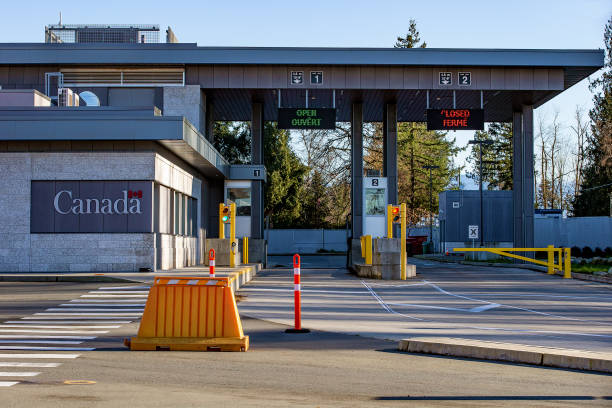I remember the bus rolling up to the border at dawn — groggy, still smelling like the whiskey from the steakhouse in Manhattan, thinking about the week of studio time ahead and a few more low-key parties in Montréal. Eight months of back-and-forth between Canada and the U.S. had become routine. I kept my head down, I was focused on music, and on that morning I had one blue bag with me.
Then a border officer told me he was suspicious. What started as a few questions turned into a search. The officers pulled everything out of my bag, patted me down, and opened up a private, fluorescent-lit room where I sat for hours. They found a pre-roll joint I’d started and forgotten to finish, and later a long tactical knife I apparently stashed and then forgot about. I answered the questions as best I could; I’d initially said I had no drugs or weapons, then remembered the knife and told them the truth. They took my items, searched me, and after several uncertain hours — during which a handcuffed person was led past that room — they told me I was not admissible to Canada and that I had to leave by June 28th. Then they released me.
It was terrifying. Would I be charged? Would this be on the news? Would I be labeled a criminal? Would my career and travel be ruined? I walked out with no suitcase, no clear plan, and a deadline.
Here’s what I learned from that morning — and practical, clear steps you can take if something similar happens to you.
What this likely means (in plain language)
– The border will make a record of the encounter. Even if you were not arrested or criminally charged, your interaction can be logged in immigration/customs systems. That can cause extra screening or questions on future trips.
– Being “not admissible” can take different forms. Sometimes officers issue a departure order or another type of removal/exclusion. The exact consequences depend on what the officer decided and whether there was a criminal charge or conviction.
– A single encounter where items are seized and you are turned away does not necessarily mean you’ll be criminally charged or put on TV. But it can still affect your ability to cross that border in the future until the issue is resolved.
– If you were charged and convicted, or if there is a criminal finding, the immigration consequences are more serious and can include bans on re-entry, the need for rehabilitation, or formal deportation processes.
Immediate practical steps to take right now
1. Get the details in writing. If you were given any paperwork, keep it. If not, ask for a clear written explanation of the decision or order. This will be crucial later.
2. Don’t try to re-enter until you know what the decision was and how to fix it. Returning before resolving the matter can make things worse.
3. Contact an immigration lawyer experienced with the country involved. Explain exactly what happened and provide any paperwork or dates. A lawyer can tell you whether the order is a departure order, exclusion, or something else, and what remedies exist (e.g., Temporary Resident Permit, leave to return, or rehabilitation applications).
4. Document everything while it’s fresh. Write down the officer names or badge numbers if you have them, time and place, exactly what was said, what was taken, and any witnesses.
5. If you were detained or believe rights were violated, ask a lawyer about filing a complaint later, but get legal advice first.
6. If you live in or have ties to the country you were denied entry to, and your livelihood depends on cross-border travel, act quickly — immigration issues can sometimes be resolved faster early on.
How this can affect future travel
– Administrative records: Even non-criminal incidents can be recorded in immigration systems. Expect extra questioning and possible denial at future crossings until the matter is cleared up.
– Criminal charges/convictions: These have far more serious immigration implications (bar on entry, need for rehabilitation, etc.). If there were no charges, you’re in a better place — still address the administrative issue.
– Be truthful on future immigration forms and interviews. Lying or hiding an incident usually causes more harm than the incident itself.
Practical tips for dealing with border officers (do’s and don’ts)
Do:
– Stay calm and polite. Hostility escalates situations.
– Have your documents (passport, ID, visas, travel proofs) ready and organized.
– Answer basic identity and travel questions truthfully and concisely.
– Ask for clarification if you don’t understand a question.
– If detained or arrested, ask for the reason and ask to speak to a lawyer. In many countries you have the right to legal counsel if you are formally detained.
– If an officer asks to search you or your belongings, you can ask if you are free to refuse — but remember: border authorities often have broad legal powers to inspect without a warrant.
– Keep a written note after the encounter: times, names, what was taken, and any paperwork or orders issued.
Don’t:
– Lie. False statements to border agents can create criminal problems and long-term immigration consequences.
– Volunteer extraneous information. Stick to the facts they ask for. Saying “I’m just visiting” is fine; narrating your life story is not.
– Physically resist a search or detention. That can lead to arrest.
– Assume that because something is legal in one place, you can bring it across the border. Laws differ by jurisdiction and crossing international lines can create legal problems even for things that are legal at home.
If you carry medications, alcohol, or items that might appear suspicious:
– Carry prescriptions and documentation for prescription medications.
– Don’t transport controlled substances across borders without absolute certainty and documentation.
– Remove illegal or questionable items from your luggage before travel. Triple-check bags.
Options to resolve inadmissibility (talk to a lawyer)
– If the border issued a small-scale “departure order,” there are often defined timelines and ways to request reinstatement or apply to return.
– If the issue involves a criminal matter or a conviction, there may be a formal route for “criminal rehabilitation” or a Temporary Resident Permit (TRP) to allow travel in some circumstances.
– A local immigration lawyer or licensed advisor can tell you which option fits your situation and help you apply.
Personal reflection
I love Canada — the music scene, the people, the labs where I recorded my EP. That’s why this experience hit me so hard: it wasn’t just about a bus stop or a lost bus ticket, it was about a sudden threat to the work I’d been building. I’m still learning that travel isn’t just logistics; it’s also legal responsibility. The small things I forgot — a knife in a bag, an unfinished pre-roll — turned into a moment that could have ended much worse.





